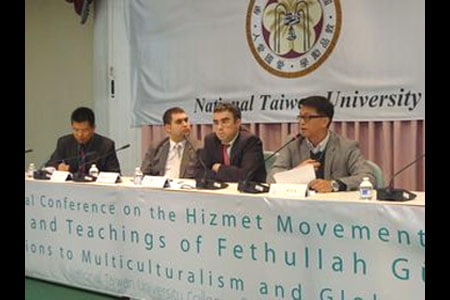Scholars: Hizmet efforts to build schools will not stop

Date posted: December 12, 2012
Taipei, Dec. 12 (CNA) Supporters of a civic movement inspired by Fethullah Gulen, one of the most important Muslim figures in Turkey, will not cease their efforts to build schools as long as there is a demand for such service around the world, according to a Turkish scholar dedicated to the movement.
The Hizmet movement places great emphasis on education, said Sait Yavuz, a lecturer and president of the Gulen Institute at University of Houston, in a recent interview with the CNA.
It was only in recent decades that Turkey began allowing the establishment of private schools, Yavuz said. He said the ban restricted the development of students with special talents.
“There are students who are promising students, who could become great scientists, but giving them the same curriculum is putting them into a narrow box,” Yavuz said.
After the government lifted the ban on private schools, Gulen and others, many of them business people, began working on the idea of setting up private schools and they opened the first one in 1982, according to Yavuz.
Although the schools had to follow a government-set curriculum, they were able to employ dedicated teachers and thus offered a better education than public schools, he said.
Students from the Gulen-inspired schools won Turkey’s first gold medal in the International Science Olympiads, Yavuz said.
Asked about the movement’s next goal, Yavuz said “there is no next step, because this step is not going to end. … It will end when we don’t need any more educational facilities, which will not happen. So we’ll continue.”
Supporters of Gulen, an Islamic scholar, educator and author with millions of followers worldwide, are believed to have established schools and educational institutions in some 140 countries around the world.
The movement has also inspired the establishment of charities, hospitals and media enterprises, including one of Turkey’s largest newspapers Zaman.
Gulen, 71, preaches a moderate brand of Islam and the need for interfaith and intercultural dialogue.
Mark Owen Webb, chairman of the Department of Philosophy at Texas Tech University, said he thinks the biggest appeal of the movement is its educational efforts to raise a golden generation of children.
Webb, who has visited schools established by Gulen’s supporters and who has been involved in the movement for a decade now, said parents frustrated with public schools may find Gulen-inspired schools attractive.
He said that during a visit to one such a school in Ukraine, he noticed that the students spoke multiple languages.
“I met one of the kids and he was practicing English, and he could have passed for an American boy,” Webb said, adding that dedicated teachers are the biggest advantage of the Gulen-inspired schools.
Asked about the Hizmet movement (aka Gulen movement) in a country like
that does not have a large Muslim population, Webb said many of Hizmet’s values are similar to Buddhist philosophies, such as the idea of reducing suffering.
Anyone can also respect and understand the notion that justice and compassion are important, said Webb, who described himself as an agnostic.
Meanwhile, Jon Pahl, a Christianity history professor and director of MA programs at Lutheran Theological Seminary in Philadelphia, said he hopes Hizmet will contribute to “a growing movement toward interreligious understanding.”
As a Christian, he said, he was impressed by the commitment of Hizmet volunteers.
Pahl said he thinks religious peace-building in the 20th century has largely been overlooked and that the Hizmet movement is part of the religious commitment to creating a more just and peaceful society.
The scholars were in Taiwan for an international conference that was held Dec. 8-9 to discuss the Hizmet movement and Gulen’s philosophy.
Source: Focus Taiwan News Channel December 12, 2012
Tags: Asia | Conferences on Gulen | Education | Taiwan |
























